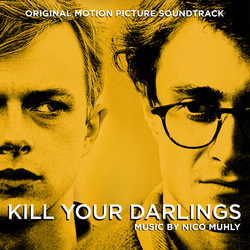
To say that Nico Muhly is new to film music would be inaccurate, as he provided the tender accompaniment to the critically-acclaimed 2008 film The Reader (as well as scored a few other indies) and has worked with Philip Glass as editor and midi-sequencer on numerous of his scores. Muhly, however, seems more inclined to write original music for his standalone compositions (that is to say, not film scores), experimenting with avant-garde classical and choral works across various albums. His creative energy has delighted as often as it has divided and perhaps it is this that makes him an intriguing choice to score Kill Your Darlings. The film revolves around the 1944 fatal stabbing of David Kammerer (Michael C. Hall) by Lucien Carr (Dane DeHaan), which looms over the emergence of the beat generation. It is less about that murder though than it is about the poets of that generation; Kerouac, Burroughs, Ginsberg, etc. Particularly, the film explores Allen Ginsberg's romantic interactions with Carr, chronicling the former's coming of age both as a gay man and as a poet.
Nico Muhly indeed brings some of the repetitive structures of Philip Glass and a good dose of the moody, orchestral beauty of his Icelandic contemporaries to this project. His ensemble relies heavily on glassy string work, deep thuds of the bass, and contemplative piano, with occasional explorations of creative, energetic percussion ideas. The score opens with "Body in Water", a very textural piece for strings that transitions to alternating piano notes over lightly growling electric guitar and sporadically thumping bass about halfway through. The ponderous "Columbia" sports a more delicate ensemble and introduces a punctuating string idea, a brief shrill that recurs throughout the score (see 0:35 in that piece ). Both "Plan On A Boat" and the concluding "Self-Defense" follow in the same manner as "Columbia", mostly rehashing the latter cue's ideas. Severe bursts of sustained strings in "The Murder" inject Kill Your Darlings with moments of apprehension and danger, though they are soon assuaged by the tender, somewhat melancholic piano of "Allen & Lucien". A bit of contemplative forward movement is gained in "Letter", which turns beautiful and somewhat whimsical from 1:16 on.
Perhaps the most engaging of Nico Muhly's work for Kill Your Darlings is featured in "Typing". Though it's regrettably brief, the lively cue features some frenetic, unconventional percussive ideas that remind of Icelandic artist Jónsi's solo debut album Go. As with the more nimble songs in that album, a cue like "Typing" allows Muhly's energetic creativity to run free. The light rhythm of "The Library" evokes coffeehouse poetry readings, while its later repetitive piano structures evoke Philip Glass. The album concludes with a handful of jazz/blues offerings (including the effortlessly cool "Harlem on Parade") from vocalist Catherine Russell, accompanied by Vince Giordano & The Nighthawks. These songs help to inject a welcome bit of period flavor into an otherwise contemporary-sounding score. One has to admire Mr. Muhly's refusal to compromise his own musical style for a period film, lending Kill Your Darlings a very contemporary, poetic sound. The unpolished rawness of Muhly's instrumentation will rub some the wrong way, and those looking for a strong musical narrative with identifiable themes will likely be disappointed in Kill Your Darlings, but somehow I still can't help but be captivated by much of this score. If you are intrigued by more avant-garde music or "contemporary classical", Kill Your Darlings is certainly worth a look. At just under 30 minutes, not much will be lost if you find yourself lacking the acquired taste.
| A Few Recommended Tracks: "Body In Water", "Typing", "Self Defense" Label: Relativity Music Group Availability: 12 track edition | |

 RSS Feed
RSS Feed
